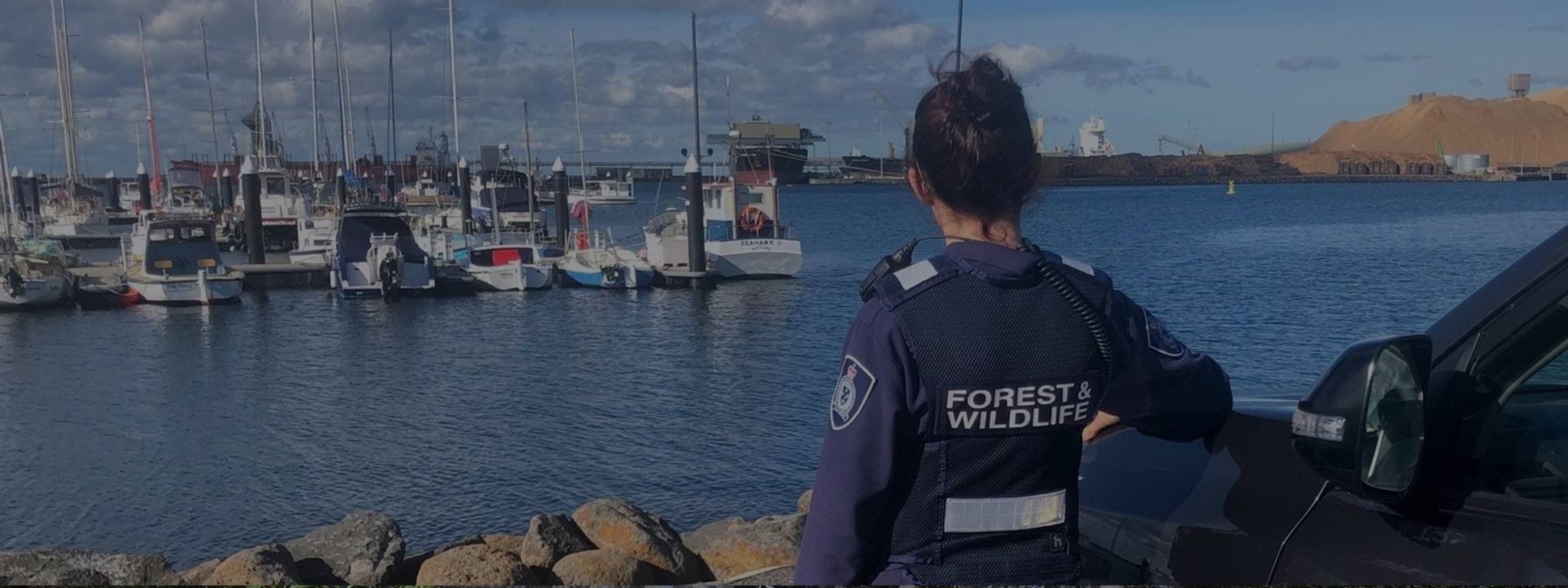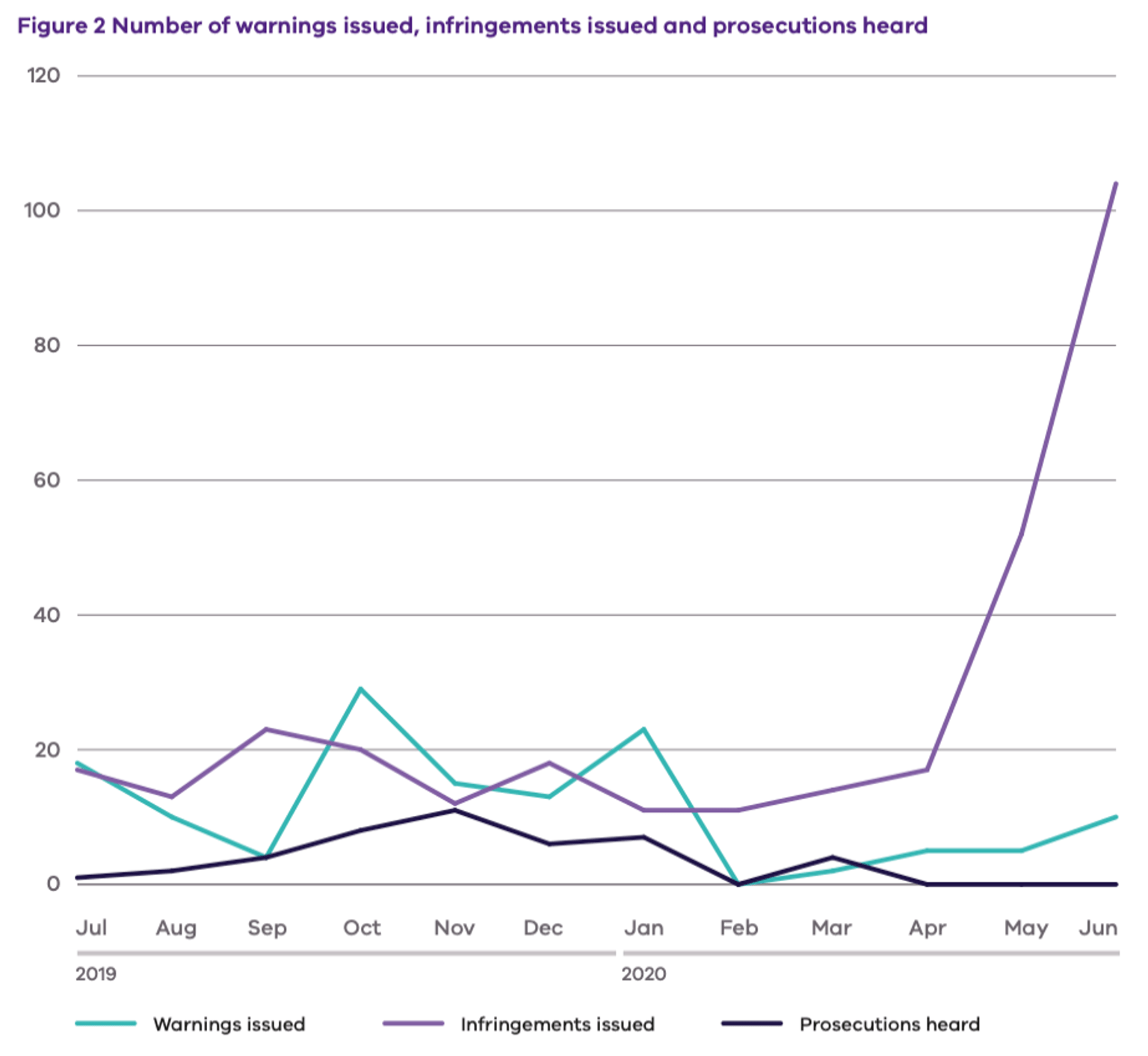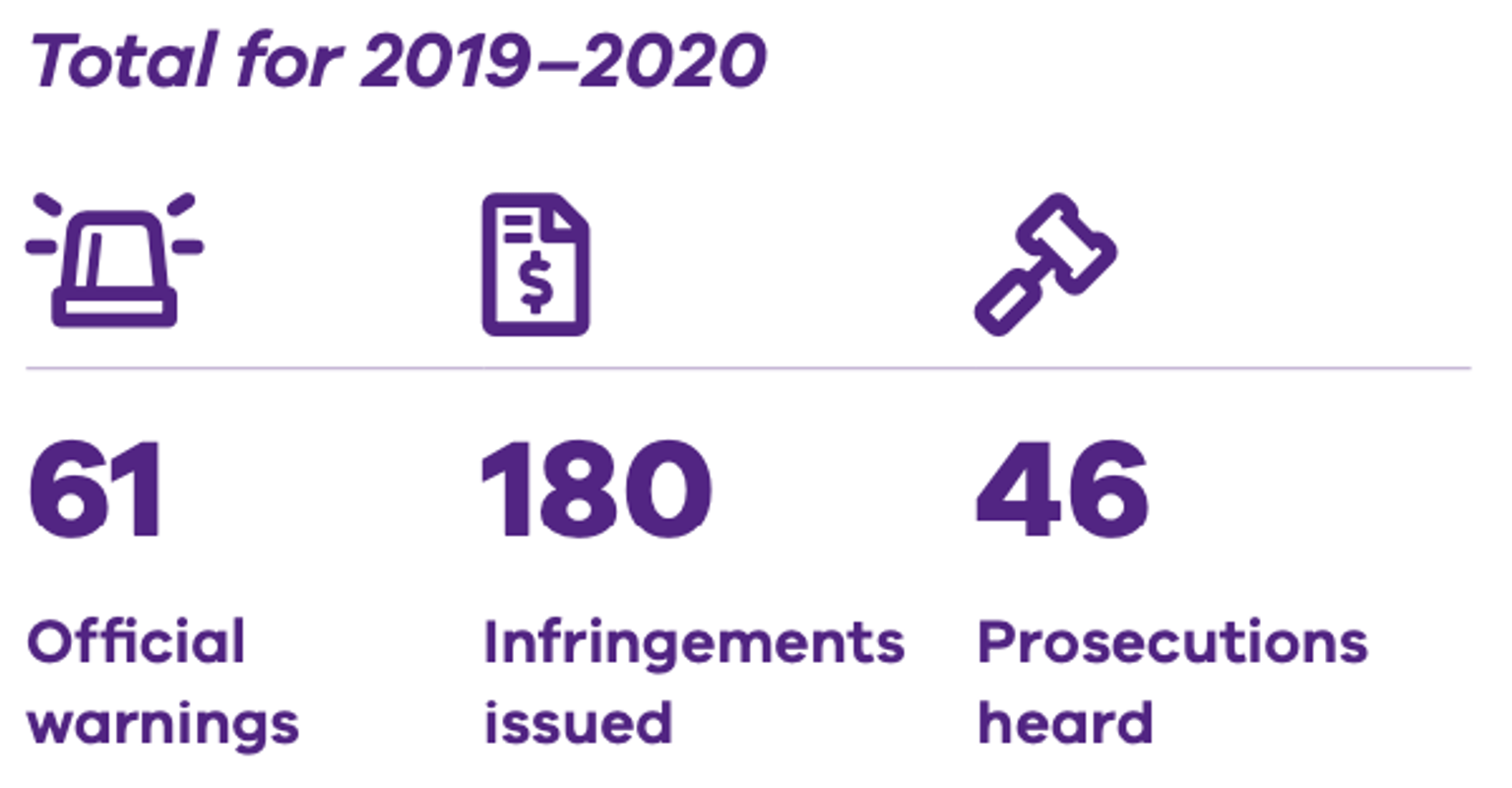- Illegal campfires
- Illegal take of firewood
- Illegal vehicle use on public land
- Unauthorised timber harvesting in native forests
Illegal campfires
Unattended or poorly constructed campfires are illegal. The warmer months of the year attract large numbers of recreational users to public land. This is at a time of the year when the bushfire risk is elevated.
Lighting a campfire on a day of total fire ban, or burning off without a permit, are illegal and pose serious bushfire risks to the community and to the environment. Our Authorised Officers play an important role in educating the community and monitoring the use of campfires, to make sure campfires are not lit on days of total fire ban and are appropriately constructed and supervised.
Compliance and enforcement action
The devastating 2019–2020 bushfire season affected 1.5 million hectares of land across Victoria and impacted 50 per cent of the modelled habitat of 212 rare or threatened species.
Throughout the season, the Conservation Regulator continued to undertake compliance and enforcement measures to protect the community from bushfires ignited by illegal campfires.
Operation Campfire was implemented across the state, which saw our Authorised Officers from the Conservation Regulator, Parks Victoria, and Forest Fire Management Victoria patrol public land and focus on high risk areas on high fire danger days, to reduce the likelihood of campfires causing bushfires.
In 2019–2020, across Victoria:
- 31 people were prosecuted for a total of 64 offences for lighting a fire on a total fire ban day or allowing a fire to remain alight on a total fire ban day
- 25 infringement notices were issued for illegal campfires
- 19 official warnings were given for leaving a campfire unattended.
Educational activities
Operation Campfire is not only about ensuring compliance but is also about education and raising awareness. Some people may be unaware of restrictions on when and where a campfire can be lit. Through Operation Campfire, we have educated more visitors to our parks about the risks of escaping campfires.
Illegal take of firewood
Population growth, a slowing economy and the increase in energy prices is driving an increase in the illegal collection of firewood. Not only do individuals seek to reduce their energy costs by collecting firewood for their own heating, some individuals take commercial quantities to sell for profit.
Common illegal firewood activities involve felling trees and taking firewood from outside the allocated firewood coupe, or selling firewood taken from Victorian public land.
To ensure the legal collection of firewood, state- wide operations were undertaken in autumn, winter and spring, targeting high-risk locations. This was supported by numerous targeted operations involving field surveillance to investigate and substantiate reports of illegal firewood activities.
Compliance and enforcement action
In March 2020, the Conservation Regulator commenced Operation Hollows with Parks Victoria and Forest Fire Management Victoria, targeting illegal firewood collection across the state. This operation involved a new approach, with a renewed focus on firewood theft across the public land estate.
In 2019–2020, a total of two prosecutions were undertaken with three charges for unauthorised firewood collection, while 41 infringements and 13 warnings were issued.
Strategy development
The Conservation Regulator is continuing to focus on illegal firewood collection. For 2020–2021 we are extending our efforts by adopting new approaches to educating about the laws for firewood collection and, trialling new methods of detecting systemic non-compliance.
Case study: Organised Crime
In May 2018, Project Firefighters in Ballarat observed the removal of firewood they believed had been cut outside a firewood collection area.
The offending included organised and commercial scale illegal felling of trees. Using camouflage and concealment techniques, Conservation Regulator Officers were able to detect and gather evidence of multiple offences.
On 30 April 2019, Officers working with Victoria Police intercepted one of the persons offending in the Ross Creek State Forest. Additionally, Forests Act 1958 and Crimes Act 1958 search warrants were executed at 3 properties in the Smythesdale area. Several items were seized, including 6 vehicles (4 utes, 2 trucks), 10 chainsaws and firewood.
Two offenders were charged on summons in relation to Forests Act 1958 offences. The matters were found proven with convictions, fines, forfeiture of the seized items and 150 hours community corrections order.
Illegal vehicle use on public land
The construction and use of illegal tracks can destroy sensitive habitats of flora and fauna, impacting biodiversity and limiting commercial and recreational access of state forests. There is also a risk of significant injury to users of illegal tracks as they are not maintained.
A key area of risk is non-compliance by trail bike riders particularly in riding off marked tracks. More than 50,000 licensed trail bike riders with registered trail bikes ride recreationally on the 30,500 kms of forest roads and tracks managed by DELWP. Riders also use the road and track network in State and National Parks.
Compliance and enforcement action
In 2019–2020, two prosecutions consisting of 7 offences were undertaken for illegal vehicle use on public land, along with 100 infringements issued and 25 official warnings.
Educational activities
DELWP and the Transport Accident Commission’s Trail Bike Initiative promotes safe, legally compliant, socially and environmentally sustainable trail riding practices.
The core activity is engaging with trail bike riders taking part in eight non-competitive social trail bike rally events conducted on state forest land. In 2019–2020, DELWP Authorised Officers participated in five trail bike events with approximately 2,000 participants.
To promote rider safety, personal locator beacons were awarded to some riders to raise awareness about the value of these devices for signalling and emergency assistance.
Unauthorised timber harvesting in native forests
The Conservation Regulator is responsible for monitoring compliance and enforcing legislation for timber harvesting in state forests. The relevant legislation includes:
- Sustainable Forests (Timber) Act 2004
- Forests Act 1958
- Conservation, Forests and Land Act 1987
- Flora and Fauna Guarantee Act 1988
- Wildlife Act 1975.
The Conservation, Forests and Land Act 1987 provides the legislative basis for the creation and enforcement of the Code of Practice for Timber Production 2014 (the Code), which incorporates the Management Standards and Procedures for timber harvesting operations in Victoria’s State forests 2014 (MSPs).
In June 2019, the Conservation Regulator published the Regulating timber harvesting in State forests under the Allocation Order Statement of Regulatory Intent, which set out a range of actions to improve regulation, as well as performance, and activity measures to monitor performance.
There has been significant focus on timber harvesting in 2019–2020. Our efforts regarding monitoring compliance, education and information, and engagement are outlined in greater detail in Chapter 4 Regulating timber harvesting.
Highlight on illegal activity relating to wildlife
There is strong demand for Australian wildlife on the international black market, and in Australia, there is commercial trade in exotic species by avid hobbyists.
This means that the taking and keeping of wildlife requires scrutiny to reduce the risk of illegal trade.
The Conservation Regulator plays an important role in monitoring the keeping of wildlife to ensure there is no cruelty or mistreatment, as well as investigating the illegal destruction of wildlife.
In 2019–2020, there was a statewide total of:
- 6 prosecutions consisting of 27 offences undertaken for illegal possession and trade of wildlife
- 14 infringements and 39 warnings issued
- 5 prosecutions with 45 charges undertaken for cruelty to or disturbance of wildlife.
Many of these cases are ongoing, and the Conservation Regulator has continued to hold those who offend to account.
Figure 2 shows the number of prosecutions heard, infringements and warnings issued over the 2019–2020 period.
Case study: Wildlife smuggling
Australia’s largest reptile smuggling ring has been disrupted in Victoria by the Conservation Regulator with 36 consignments of wildlife intercepted at the Melbourne Gateway Facility of Australia Post destined for Hong Kong.
The Conservation Regulator worked with Australian Border Force, Department of Environment and Energy, Australia Post and RSPCA Victoria on this operation to investigate the case.
A man had concealed the lizards by packing them into socks inside rice cookers and deep fryers and posting them from Melbourne to addresses in Hong Kong. He pleaded guilty in the Melbourne Magistrates’ Court to 6 charges under the Wildlife Act and 61 charges under the Prevention of Cruelty to Animals Act 1986 in relation to the same animals.
Currently, 4 additional people are before the courts waiting outcomes with one offender currently facing 395 charges for their part in the matter.
The people associated with this aspect of the offending have also been charged in relation to dealing in the proceeds of crime and wildlife related offences.
Nearly 400 surrendered animals from the collection of the main offender are being cared for by Wildlife Officers.
The increases in infringements in May and June relate to increased patrolling of public land following an easing of COVID-19 restrictions. Patrols found a significant increase in illegal use of tracks by trail bikes and unattended campfires.
Updated







